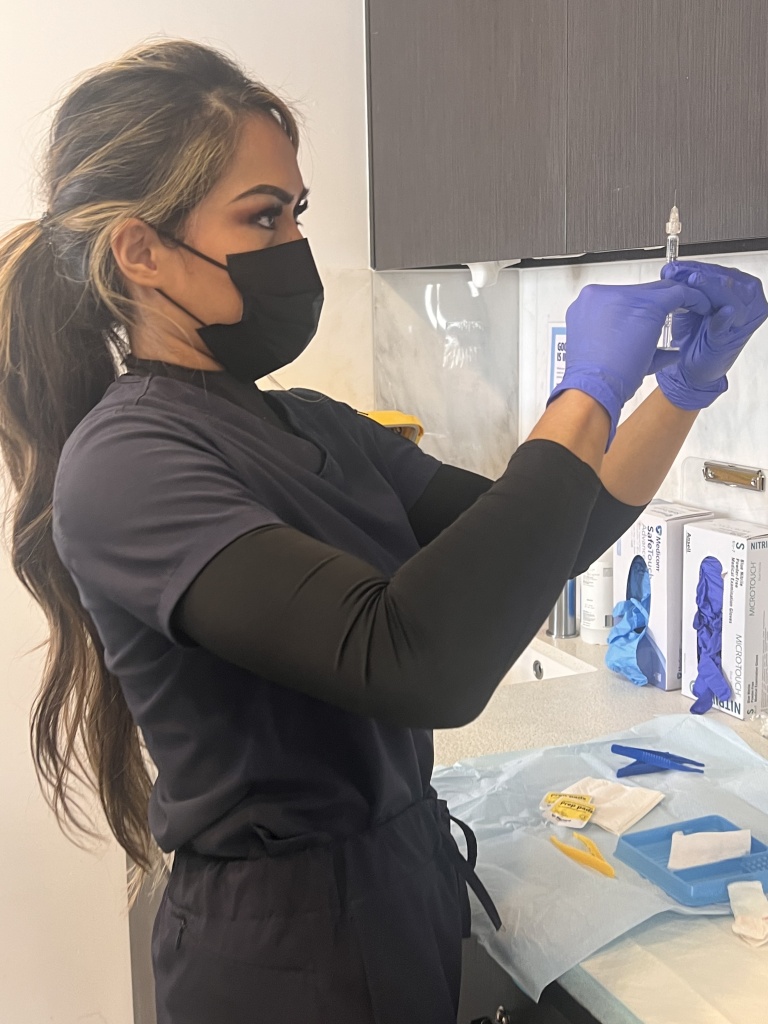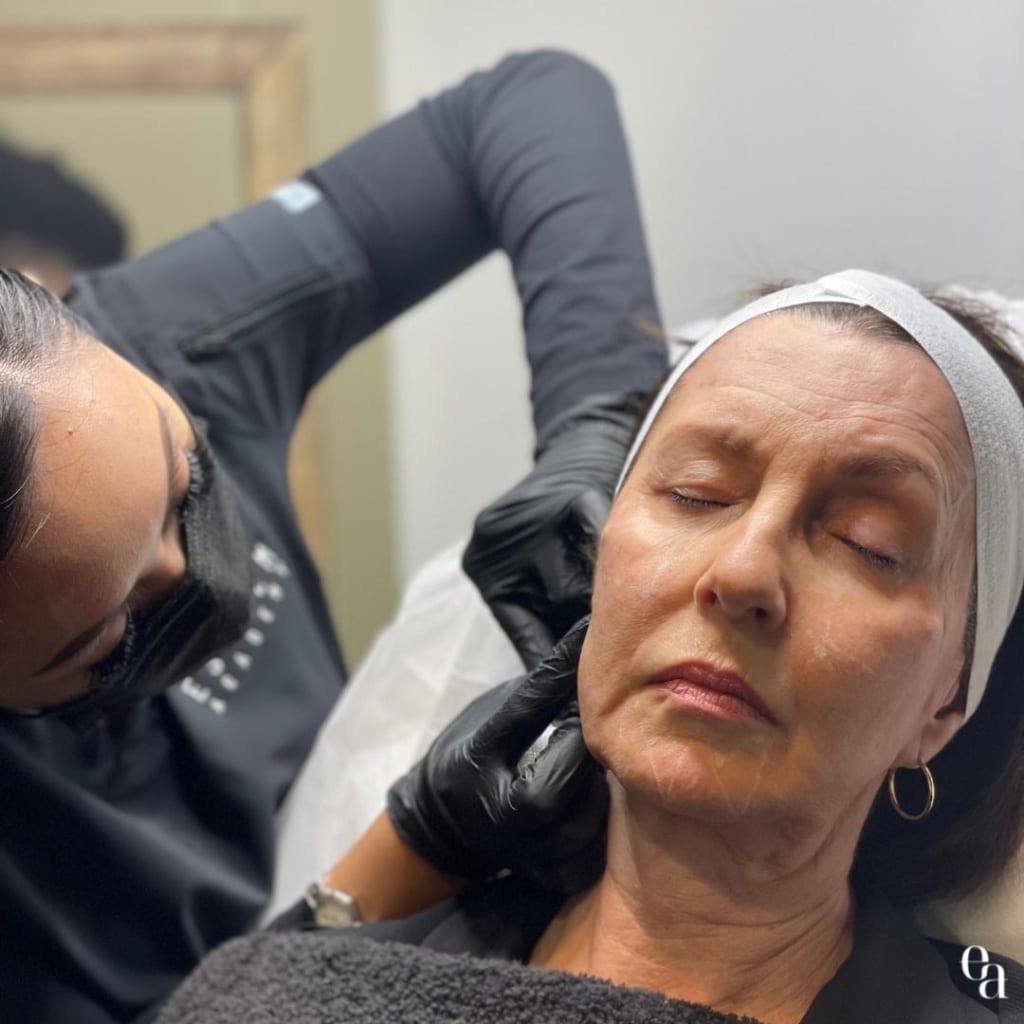
Choosing between aesthetic nursing and traditional nursing can be challenging, as both offer unique opportunities and career paths. In this article, we’ll explore the key differences between these two nursing fields, helping you determine which aligns best with your skills and aspirations. Don’t forget to take the helpful quiz at the end to see which path suits you best!
Defining Aesthetic Nursing vs Traditional Nursing
What is Aesthetic Nursing vs Traditional Nursing?
On the one hand, aesthetic nursing (also called cosmetic nursing) is a specialised field within the broader nursing profession focused on non-surgical cosmetic procedures aimed at enhancing a patient’s appearance. They work closely with aesthetic skin and laser professionals, dermatologists, plastic surgeons, and other healthcare practitioners in the aesthetic field, r or private offices. They often perform or assist with procedures such as anti-ageing injections, soft tissue augmentation treatments (also known as dermal fillers), chemical peels, laser treatments, and skin procedures. Aesthetic nurses also play an important role in patient education, helping clients understand the potential risks, benefits, and outcomes of the treatments they seek.
On the other hand, in traditional nursing roles, nurses provide essential medical care, support, and treatment to patients in a variety of healthcare settings. Traditional nurses are mainly responsible for assessing patient health, assisting in surgeries, monitoring vital signs, and administering medication while offering emotional support to patients and their families.
Required Education and Certifications
To become an aesthetic nurse in Australia, you typically need to complete a Bachelor of Nursing degree and become a Registered Nurse (RN). Following this, specialised training in aesthetic procedures is required, which can be obtained through industry endorsed courses and certifications which can enhance career prospects and ensure adherence to industry standards.
For traditional nurses, the pathway generally begins with completing a Bachelor of Nursing degree and gaining registration as an RN. Depending on the area of specialisation, further education may be required, such as a Graduate Certificate or Diploma in areas like critical care, paediatrics, or mental health nursing. Ongoing professional development is also essential to maintain registration with the Nursing and Midwifery Board of Australia (NMBA).
Career Path Comparison
Scope of Practice
Regarding the scope of practice and daily responsibilities, traditional nursing differs significantly from aesthetic nursing.
Aesthetic Nursing
Firstly, in aesthetic nursing, the primary focus is on elective, non-surgical procedures that enhance a patient’s appearance. Daily responsibilities include:
- Aesthetic nurses must have a keen eye for detail, an understanding of facial anatomy, and a strong sense of aesthetics to achieve desired outcomes. Their practice is more client-focused, with an emphasis on patient satisfaction and education.
- Conducting thorough patient consultations and the understanding of treatments expectations and alternate treatment options.
- Providing advice of potential risks, complications, post-treatment care and advice.
- Performing procedures such as anti-ageing injections, soft-tissue augmentation procedures (such as dermal filler), and collagen stimulation treatments.
Traditional Nursing
On the other hand, traditional nursing involves a broader scope of practice that encompasses a wide range of patient care activities. Responsibilities can vary greatly depending on the nurse’s specialty but generally include:
- Administering medications
- Monitoring patient vitals
- Assisting with surgeries
- Providing wound care
- Offering emotional support to patients and their families.
Traditional nurses often deal with acute and chronic medical conditions, requiring a comprehensive understanding of medical procedures, disease management, and patient care techniques.
Looking for a way to shift your nursing skills to cosmetic aesthetics?
Job Opportunities and Demand
Aesthetic Nursing
Aesthetic nursing is a growing field in Australia, driven by the increasing popularity of cosmetic procedures – the demand for aesthetic nurses is expected to rise as more people seek non-surgical treatments to enhance their appearance. This field offers opportunities in aesthetic skin and laser clinics, private practices, medspas, dermatology and plastic surgery practices. However, the market can be competitive, with success often dependent on building a solid reputation and a loyal client base.
Traditional Nursing
Traditional nursing, however, remains one of the most in-demand professions in the healthcare industry. With an ageing population and increasing healthcare needs, the demand for nurses in hospitals, aged care facilities, and community health settings continues to grow. The diversity of roles within traditional nursing means abundant opportunities across various specialties, from critical care and emergency nursing to paediatrics and mental health.
Healthcare trends such as medical technology advancements, patient demographics changes, and a greater emphasis on preventative care impact both fields. Aesthetic nursing benefits from technological innovations in cosmetic treatments, while traditional nursing sees increased demand due to the rising prevalence of chronic diseases and the need for more specialised care.
Salary and Compensation
Aesthetic Nursing
Aesthetic nurses in Australia can earn a competitive salary, often influenced by location, experience, and the specific procedures they perform. According to industry data, aesthetic nurses earn anywhere from AUD 70,000 to over AUD 100,000 annually. Additional compensation may include bonuses and commissions based on performance, client satisfaction, and sales of cosmetic products or services.
Traditional Nursing
Traditional nurses, particularly those working in public hospitals, typically have a more standardised pay structure. The average salary for a registered nurse in Australia ranges from AUD 65,000 to AUD 85,000 per year, also depending on experience, location, and specialty. Traditional nurses may also receive additional compensation for overtime, shift work, and other allowances. However, the opportunity for bonuses and commissions is generally less prevalent than aesthetic nursing.
Work-Life Balance
Aesthetic Nursing
Aesthetic nursing often offers more predictable work hours, as many cosmetic clinics and aesthetic clinics operate during standard business hours. This can lead to a better work-life balance, with fewer instances of night shifts or weekend work. However, some aesthetic nurses may work extended hours or weekends to accommodate client schedules or perform follow-up care.
Traditional Nursing
Traditional nursing, especially in hospital settings, can involve more demanding schedules. Hospital nurses may work long shifts, including nights, weekends, and public holidays, which can impact work-life balance. The nature of the work, which can be physically and emotionally demanding, also contributes to higher stress levels in traditional nursing roles.
Pros and Cons of Each Career Path
When comparing the two career paths, it’s important to comprehend the pros and cons of each role fully. Take a look at the graph below to help decide which position you see yourself pursuing long-term.
– Creative and Artistic Aspects: Allows nurses to use creativity to enhance patients’ appearances.
– Patient Relationships: Often involves building long-term relationships with clients who return to enhance their natural aesthetics.
– Predictable Work Hours: Typically offers more regular hours, contributing to a better work-life balance.
– Variety of Specialties: Offers opportunities to work in a wide range of specialties (e.g., ICU, paediatrics, mental health).
– Job Stability: High demand for traditional nurses ensures strong job security and diverse career options.
– Meaningful Impact: Provides the opportunity to make a significant difference in patients’ lives, often in critical situations.
– Market Competition: This is a highly competitive field that requires individuals to create a strong client rapport and trust.
– Ongoing Training: Continuous education and training are required to advance skill set, stay updated on the latest cosmetic techniques and technologies to support a variety of clients and their desires.
– Client Expectations: Clients’ high expectations for aesthetic outcomes can create added pressure to achieve optimal results.
– High Stress: Working in high-pressure environments such as emergency rooms and intensive care units can be stressful.
– Long Shifts: Often involves working long hours, night shifts, weekends, and public holidays, which can impact personal life.
– Physical Demands: Physical stamina is required due to long hours on feet, heavy lifting, and managing multiple patients simultaneously.
Who Should Consider Each Path?
After taking into account the demands, job opportunities, scope of practice, and work-life balance of both career options consider looking into the following “soft skills” and which option would be better regarding career goals and interests.
– Attention to Detail: Aesthetic nurses need a meticulous eye for detail to achieve precise cosmetic results.
– Creativity: The role often requires an artistic approach to enhance and balance facial features.
– Interpersonal Skills: Strong communication and client rapport skills are essential to build trust and ensure satisfaction..
– Empathy: Traditional nurses must have a deep sense of empathy to provide compassionate care to patients in various states of health.
– Resilience: The ability to handle stressful situations and emotional challenges is critical in traditional nursing.
– Problem-Solving: Quick thinking and the ability to make decisions under pressure are key traits for success.
– Interest in Beauty and Wellness: A passion for aesthetics, beauty, and non-surgical treatments is crucial.
– Client-Centric Focus: Ideal for those who enjoy building long-term client relationships and focusing on individual care.
– Desire for Specialisation: Offers the opportunity to become highly specialised in a niche area of nursing.
– Interest in Diverse Medical Fields: Suits those who are eager to explore different medical specialties and work in various healthcare settings.
– Commitment to Patient Care: A strong commitment to improving patient outcomes and supporting their health journey.
– Desire for Career Growth: Traditional nursing offers diverse opportunities for advancement and specialisation, including leadership roles.





